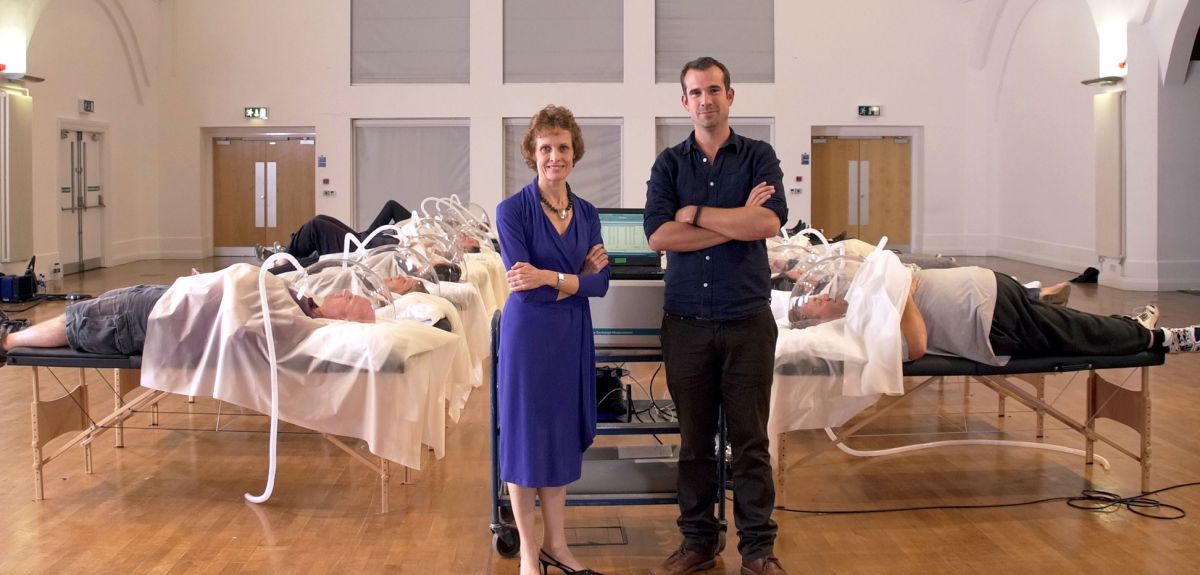
Image courtesy of BBC Pictures.
Can science find the right diet for you?
In a 3-part of the BBC's science documentary series Horizon, starting tonight on BBC2 at 9 pm, Susan Jebb and Paul Aveyard from Oxford University, together with Giles Yeo and Fiona Gribble from Cambridge, explore whether personalized diets tailored to different causes of overeating can succeed where other diets have failed. 'What I would like people to take away from watching the programme is that rather than jumping on the bandwagon of the latest diet or celebrity endorsement, it is more important to think about the way you live your own life and understand your own triggers, in order to find a diet that works for you', says Susan Jebb, professor of diet and population health at the Nuffield Department of Primary Care Health Sciences at the University of Oxford. Oxford Science Blog asked her about her experience with the programme.
OxSciBlog: What are the new ideas being explored in this TV series?
Susan Jebb: Previous discussions about tailoring diets to individual physiology for weight loss have mostly been based on retrospective analyses: by which I mean that it is only after a large study has been done, and a group of people have all gone on a particular diet, there is occasionally some discussion of the characteristics of the people who were more or less successful at losing weight. I cannot think of any studies where researchers have put forward a hypothesis about specific diets being particularly effective for groups of people with a certain trait, and then gone out and tested it. So the TV series gave us a chance to explore a new research direction, though we really need to do more controlled experiments in order to establish any conclusions about personalized diets being more successful than a 'one size fits all' approach.
OSB: What did you get out of working on the programme? Has it changed your day-to-day work?
SJ: It gave me a chance to interact very directly with a large, diverse group of people trying to lose weight. Their stories have directly influenced and shaped some of our research plans: my DPhil student, Jamie Hartman-Boyce, is now working on the self-management of obesity, which we know very little about. Drawing on the experience of the volunteers in the programme, we have developed a questionnaire, the Oxford Food and Activity Behaviours (OxFAB) to elucidate the strategies people use to manage their weight. We would now like to invite lots of other members of the public to get involved too, by clicking through to our website and completing the questionnaire.
People who choose to enrol in the study will be able to track their weight over time and fill in the questionnaires online. The programme participants found that answering the questions helped them to identify new strategies they could try. As time goes on, participants will get feedback on what other people are doing and will be able to compare that to the strategies they are using. Meanwhile, we will be able to build up a picture of the strategies people use and over time to relate the strategies people use to the weight they lose. By understanding strategies associated with success, we hope to be able to develop more effective interventions.
OSB: Who do you hope will watch the programme?
SJ: This programme was also a great way of talking to people such as health professionals and policy-makers. One of my concerns is that within the NHS, we don't necessarily give people a lot of help to lose weight. I am sorry to say that too often, there is still an attitude which says that 'People just need to pull themselves together and eat less'. I hope that this programme might help people begin to recognize that that there are differences between individuals which make it much harder for some people to lose weight than others. Like managing any other chronic condition, people trying to lose weight need our support, not criticism. I hope that raising awareness of the issues that the programme discusses might lead to a more supportive atmosphere for those who want to lose weight.
OSB: How did you get involved in working with Horizon?
SJ: Nutrition is in the media all the time, and I've been involved in media outreach since I was a post-doctoral researcher. I get the same buzz out of media work as I do from academic presentations. In my experience, working with the BBC has been incredibly productive. We have in fact collaborated with Horizon before, and you can almost track the history of scientific developments in obesity through Horizon. I have been in contact with the producers of this programme for almost 2 years now, and indeed, the questions that this programme looks at have developed collaboratively. There was sometimes tension between the competing demands of providing entertainment versus doing science but with discussion, we were able to iron them out. That said, I think it is important to emphasize that the 'experiments' in the programme work as demonstrations of scientific concepts to illustrate aspects of the work. The BBC creative department was really great at bringing these aspects to life and illustrating some of the scientific studies that might otherwise be difficult for a general audience to understand.
I am very passionate about taking the results we get from scientific research and getting it out into society, where it can make a difference to people's lives right now. The media is a fantastic way to do this: far more people will watch this BBC series, compared to the number of people who might be expected to come to a public lecture in Oxford.
OSB: What were the best and worse things about working on a prime-time television programme?
SJ: The best thing for this series was working alongside some of my colleagues and seeing them doing things that I would never have imagined they would do: Giles Yeo (at Cambridge) clad in gauntlets in a meat freezer, wielding an enormous knife, and Paul Aveyard (Professor of Behavioural Medicine at Oxford) in a scene reminiscent of the Great British Bakeoff, talking about an unplanned cake eating incident'.
The worse thing about television is that it is SO time-consuming and so much ends up on the cutting room floor. On one occasion, I spent 5 hours sitting around in a field, and about fifty words have made it on screen.
OSB: What advice would you give to someone thinking of being involved in television?
SJ: First, I would absolutely say do it: I think it presents amazing opportunities to make science part of everyday conversation. But here are some things to keep in mind:
- Choose your programme and production team very carefully. In dieting and nutrition, there are some very exploitative programmes around which I would not be comfortable being linked to. So do your groundwork.
- Don’t ever compromise your scientific and moral principles. Yes, you need to simplify, but it is important that you never get yourself into a position where you are saying something that you wouldn’t be prepared to defend later.
- Relax – it may not be perfect but how many scientific papers do you look back on and feel they were perfect? And like an academic presentation or a grant application, it gets easier over time and hopefully you get better with practice.
Professor Susan Jebb is the speaker for the 2015 Oxford London lecture on 17th March, 2015. The lecture is open to the public, and will discuss how to improve the nation’s diet.
 Ancient waters expand search for 'deep life'
Ancient waters expand search for 'deep life' Gannets of the far North
Gannets of the far North Walker's baby steps towards molecular robots
Walker's baby steps towards molecular robots Handheld breath device could 'sniff out' diabetes
Handheld breath device could 'sniff out' diabetes Vibrations reveal how material 'takes a breath'
Vibrations reveal how material 'takes a breath'